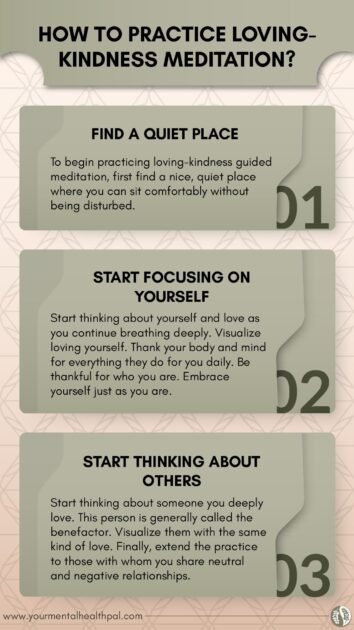Kindness is a behavior associated with being generous and caring toward others. Loving is used as an adjective to describe someone who shows their love and affection to other people. Combine these two words together, and you have loving-kindness meditation – a practice rooted in compassion and empathy.
Loving-kindness meditation (LKM), also known as metta meditation, is a compelling practice that allows you to extend the power of your meditation toward those around you. Even though other forms of meditation will also cultivate a kinder and more empathetic mindset, loving-kindness meditation is a more directed approach to the whole idea.
It helps you direct your kindness, good wishes, and compassion toward yourself and, eventually, the people around you.
Wondering what guided loving-kindness meditation is? Or how can you practice it?
We have got you covered.
This blog post is your complete go-to guide for a guided loving-kindness meditation session.
Through the course of the blog post, you will understand what loving-kindness meditation is, its benefits, and its steps. We have also provided you with a complete guided loving-kindness meditation session at the end. Let’s get started.

What Is Loving-Kindness Meditation?
Loving-kindness or metta meditation is designed to make you more generous and compassionate toward others by directing loving and friendly wishes. The word metta comes from the Pali language and literally means loving-kindness. In some cultures, it is also used to define universal goodwill.
The roots of loving-kindness meditation are thought to have originated in ancient India before Buddha. It has traditionally been a part of Buddhist philosophy. However, its ideals can also be found in Hindu and Jain texts.
The primary motive of metta meditation is to develop and send out kindness to everyone in the world. It is a powerful way to exercise compassion and forgiveness toward yourself and people you know or don’t know. Visualizing yourself sending love and kindness toward the world can genuinely make you happier, calmer, and less stressed.
It is particularly beneficial for people looking to learn more about being accommodating, grateful, and forgiving. Additionally, it will also help you become a better communicator and have an enhanced relationship with yourself and others.

Components Of Metta Meditation
Metta meditation is composed of three components:
- Recipients
- Formulas
- Repeating
Recipients are people you aim to direct your kindness toward, such as family, friends, co-workers, challenging people in life, or just the world.
Formulas are the grateful and loving messages you send out to the world. It is the phrases you use to convey kindness and their meaning. Through formulas (phrases and words), you direct your mind toward love, care, and kindness. When these feelings come together in your mind, you can experience and spread them better.
Finally, constantly and intentionally repeating formulas is a way to internalize the positivity in yourself. Through repeating, you let your mind dwell on the emotions associated with these phrases.
Types Of Loving-Kindness Meditation
There are a few different types of loving-kindness meditations.
The easiest form of metta meditation is radical openness.
It is also a form of dialectical-behavioral therapy that is used to help let go of their overly controlling behaviors.
In this form of metta meditation, you think of one person you dearly love and have strong positive feelings for and another you don’t know properly or have no feelings for. Then, you channel your emotions for the latter by transferring your love, care, and good wishes to them.
The other form, Befriending meditation, is considered a relatively tricky practice. In this form, you are tasked with nurturing positive feelings toward someone with whom you have had a problematic relationship.
What Are The Benefits Of Loving-Kindness Meditation?

You might be familiar with the benefits of traditional meditation, but metta meditation will leave you with much more than just a calm and relaxed mind.
In the short term, loving-kindness meditation can make you feel safe, content, and loved. These benefits can last from a few minutes to hours following the meditation practice.
In the long term, LKM can help you feel more connected to others, better understand yourself and the world around you, and substantially improve your self-esteem.
Let us dive deeper into the science-backed benefits of metta meditation and understand if it really works.
1. Increased positive emotions.
A study by Barbara Frederickson and team (2008) found that LKM significantly induced positive emotions following a seven-week practice. It was associated with increased joy, love, kindness, and hope among the participants.
Eventually, these positive emotions led to long-term gains in personal resources like increased self-awareness and self-esteem, greater social support, and an overall better quality of life. However, researchers have emphasized that more in-depth research is required to quantify the findings.
2. Reduction in depression and post-traumatic stress disorder symptoms.
In a clinical trial in 2021, researchers compared the impact of LKM and cognitive processing therapy in two groups of war veterans. The reduction in PTSD symptoms for both groups was similar. Additionally, the group with LKM had a more significant reduction in depression symptoms.
Another 2021 study by Ying Wang and team found that mindfulness-based cognitive behavioral therapy in combination with loving-kindness meditation significantly improved depression symptoms and enhanced their quality of life.
3. Decreased migraine.
Another study by Tonelli and team found that one of the immediate loving-kindness meditation benefits was reducing migraine headaches. LKM significantly reduced the intensity of pain in migraine patients. It also reduces emotional tension generally related to chronic migraines.
4. Increases emotional intelligence and empathy.
The human brain is shaped by the activities that you undertake. Therefore, practicing LKM strengthens and activates areas of the brain that deal with emotional intelligence and empathy. Research by Hutcherson and team shows that LKM also improved emotional processing and expression in participants.
How To Actually Do Loving-Kindness Meditation?
Even if you have never practiced meditation, learning how to do loving-kindness meditation is easy. A simple guided metta meditation session involves using imagery and a few mantras.
Starting small and practicing a few minutes daily can be beneficial for beginners. All LKM needs is a quiet place and some free time away from distractions. Let us look at how you can begin practicing loving-kindness guided meditation at home today!
Loving-Kindness Guided Meditation Steps
1. Find a quiet place.
To begin practicing loving-kindness guided meditation, first find a nice, quiet place where you can sit in a comfortable position without being disturbed. Close your eyes, focus on yourself, and relax. Take a few deep breaths to center yourself.
2. Start focusing on yourself.
In the following loving-kindness guided meditation step, start thinking about yourself and love as you continue breathing deeply. Imagine yourself as a physically and emotionally healthy person. Visualize loving yourself. Thank your body and mind for everything they do for you on a daily basis. Be thankful for who you are. Embrace yourself just as you are.
Recite the following mantras or something along similar lines:
“Maybe I will be filled with compassion and kindness.”
“May I be completely healthy in body and mind.”
“May I always be at ease and happy in life.”
For the first few weeks of practicing loving-kindness guided meditation, keep the focus on yourself. Move to the next step only when you feel you have achieved a certain level of self-love.
3. Start thinking about others.
In the next loving-kindness meditation step, start thinking about someone you deeply love. This person is generally called the benefactor. A benefactor is a person who has shown you immense love and care.
Now recite the phrases you used for yourself but for this person:
“Maybe you be filled with compassion and kindness.”
“May you be completely healthy in body and mind.”
“May you always be at ease and happy in life.”
Pro tip: The purpose of metta meditation is to cultivate and nurture feelings of love and kindness. Therefore, you can alter the steps according to your needs. A lot of people feel comfortable with showing love toward others than themselves. Consequently, they can begin focusing on others and slowly start thinking about themselves.
In the next step, you can expand the feelings of love for those you have neutral feelings for. Eventually, you can focus on people with whom you share unhealthy relationships.
How To Make Loving-Kindness Guided Meditation More Effective?
Let’s be honest – LKM is a difficult practice. But you can make the practice of loving-kindness meditation more effective by thinking about positive things in life.
Here are a few additional things that can help you make your LKM practice better:
1. Feel the physical sensations that arise when you think about the people you love.
2. Notice how you feel when you think about sending love to those with whom you share a difficult relationship.
3. Picture two people simultaneously: one with whom you have a great relationship and one with whom you have some past grievances. Now try sending love to both of them equally.
4. Try not to resist unpleasant emotions.
5. Be mindful of the posture you are sitting in.
6. Make it a walking meditation session if you have trouble sitting still.
7. Don’t be too hard on yourself. You will get there eventually.
Conclusion:
Loving-kindness meditation is an ancient Buddhist practice that helps you become more kind and compassionate toward the world around you. It makes you a better communicator, reduces stress and anxiety, increases emotional intelligence, and makes you a better person on the whole.
In times like ours, when hatred and differences have seeped deep into our world, there is no better time to adopt metta meditation in our lives. We hope this LKM guide will get you started in the right direction.
Apart from LKM, there are different types of meditation practices to enhance your life. To learn more about them, click here.
To continue learning about mental health daily, subscribe to Your Mental Health Pal.

